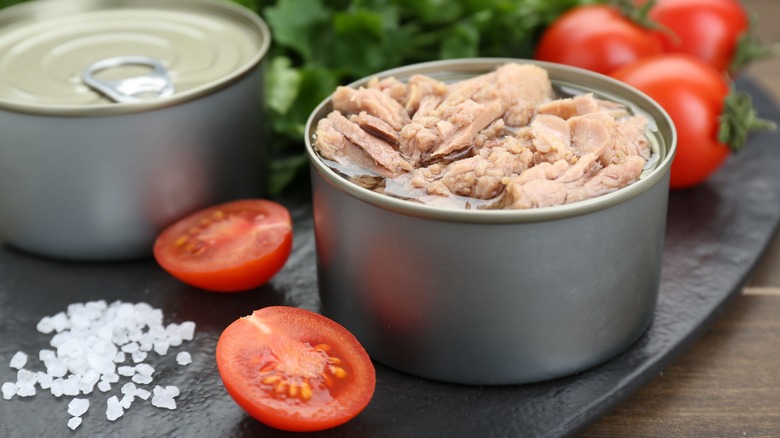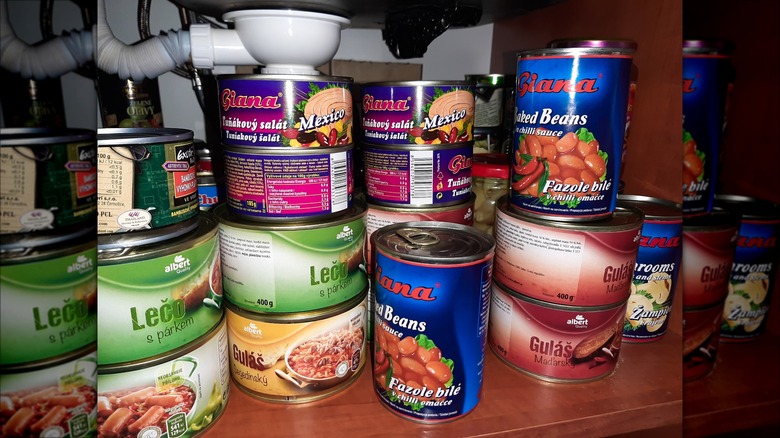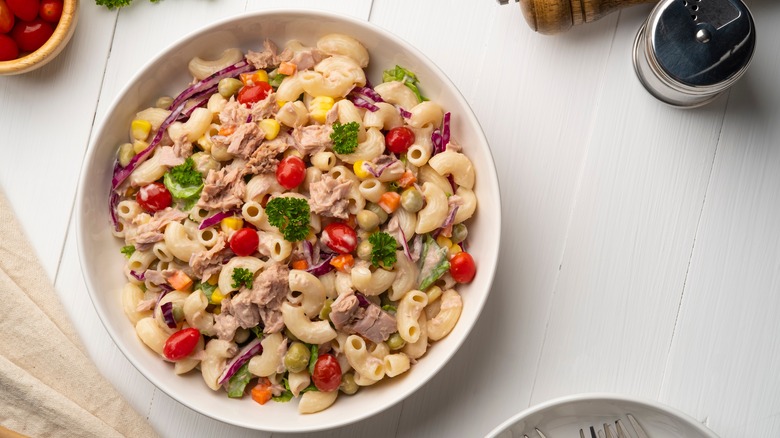Why You Should Think Twice Before Storing Canned Tuna In The Pantry
In an organized kitchen, everything has its place, and when you bring canned tuna home from the supermarket its home is the pantry. Being shielded from sunlight and moisture, and generally holding a consistent temperature, the pantry is a solid location to store all your dry goods. Canned tuna will typically last between three to five years under optimal temperature and humidity conditions, but if those conditions are not met, your packed fish could be in trouble. Ideally, pantries should hold a temperature of 50 to 70 degrees Fahrenheit, which is a model climate for canned tuna, but some — especially in warmer seasons — rise above this mark and put your chicken of the sea at risk of spoilage.
There are various places stockrooms get built into homes, and some locations aren't as favorable as they could be. For example, a pantry that dwells next to a dishwasher could see its temperature rise periodically, and moisture that escapes the bay when loading and unloading it can accumulate inside and promote mold growth and rust. To make sure your Albacore is safe from sub-par storage conditions that can cause it to spoil, the best bet is to stash it in the back of your fridge where it can stay cold and dry because dishwashers are not the only concern when it comes to keeping canned tuna in the pantry.
More reasons refrigeration is best for canned tuna
The back of the refrigerator is the safest place to store canned tuna because the conditions will remain consistent as long as the temperature is set correctly. Pantries, however, are subject to climate fluctuations that can occur because of outside sources. The heat from appliances, like ovens and dishwashers, that are in close proximity to your stockroom can cause the temperature to rise inside to levels that can promote food spoilage.
A pantry with a solid door can also be a problem. When the food closet doesn't have adequate ventilation, it can hold in heat, which again poses a problem when the area shouldn't rise above 70 degrees. Some pantries have windows, which is fantastic for ventilation, but if there are no curtains or they don't get closed occasionally, your canned tuna might be exposed to direct sunlight, which can lead to the product going bad.
Another thing to consider is whether or not one of the walls of your pantry is also an outside wall. If so, when the outside wall warms up on hot, sunny days, the heat can radiate through the wall into the storage space, potential causing problems for your canned tuna. Storing it in your refrigerator is the most secure place to let it stay until you are ready to eat it. Thankfully, because many recipes call for cold tuna anyway, you'll be one step ahead of the game when preparing to make a dish.
Some canned tuna dishes call for cold tuna
If you've ever been craving a cold tuna salad, you know it's not something you can whip up on the fly. Once you mix all the ingredients together, you're left waiting until the protein cools from room temperature to the level of the crisp, refrigerated vegetables mixed with it. There are plenty of ways to upgrade the salad itself, but you can save some time waiting for it to cool down by keeping your canned tuna in the fridge so it will already be cold when you want to create the dish. The concept works the same for a cold tuna pasta salad or a cold tuna wrap. For any of these dishes, double-check the label and look for the little blue fish when you're purchasing it to make sure you are getting the best tuna possible.
Whether you store canned tuna in the fridge or take a gamble on the pantry, always inspect the can and look for signs of spoilage before consuming it. If the can is dented, bloated, or rusting, you should carefully check the contents for signs of contamination — like an off-putting smell or a slimy appearance. With the consistent environment the refrigerator provides, these occurrences are less likely to happen if you store canned tuna in the fridge, and by going above board to help it avoid spoilage, you're also saving yourself some time when you want to prepare a cold dish by keeping it chilled.


